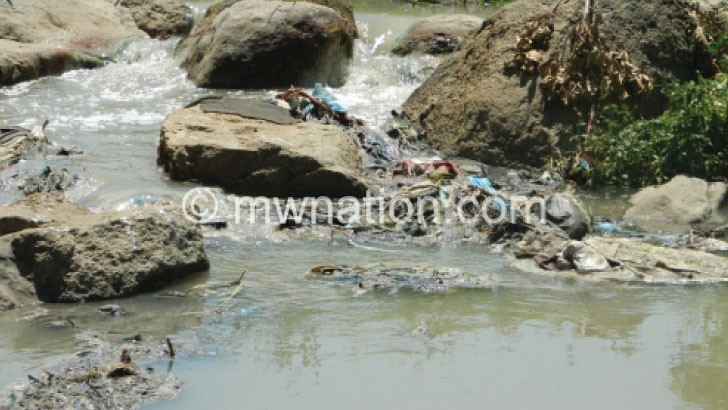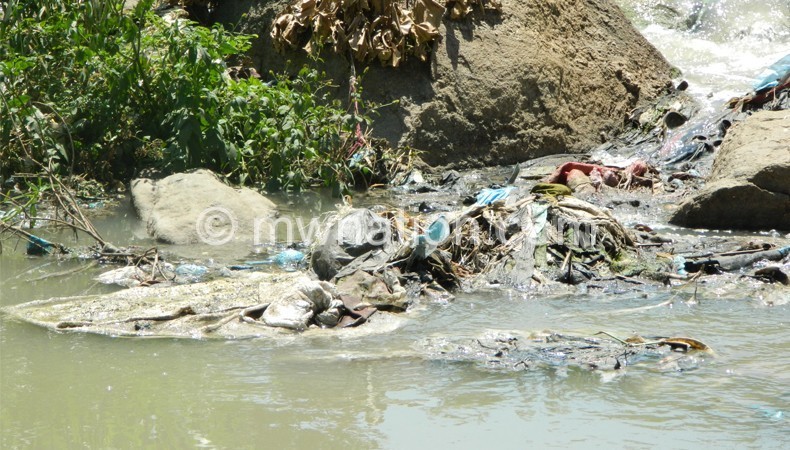Stinkers in your city
In Blantyre City, Mudi River offers passers-by an ugly face of official indifference fuelling water pollution in Malawi.
On Monday, President Lazarus Chakwera said it is disgraceful that there are foul-smelling rivers in cities and the capital city, Lilongwe, has become a cholera hotspot.

The “positive step” sounds pleasing to Manota Mphande, one of the Blantyre-based artists who brave the stench of the foaming river picking pieces of cloths, plastics and wood for reuse.
“I’m happy the President has mentioned this subject. Our rivers have been under pollution for a long time. In Blantyre, few rivers that run through townships are also the main catchment for our water,” he said.
Mphande hopes “real action is taken” to stop city residents, factories, traders and residents from dumping waste in rivers.
The rampant breakdown in waste management pollutes water and increases the risk of floods.

From their walks to clean up the Mudi, Mphande’s ArtMalawi team sees the long polluted river change colour while environmental protectors get their full pay.
The waste is dominated by thin plastics from populous townships, underserved markets and Makata Industrial Area.
Disgusting
Downtown Blantyre, the stink from the river that changes colour like a chameleone haunts hundreds of traders and shoppers on its banks.

Mphande explains: “The river changes colour and foams every day. What is dumped determines its colour and smell.
“Some days it’s red like blood. Other times, it is brown, it could be a sewer. Some days, it looks whitish, could be waste from milk processing companies. And there are times it looks greenish, you can’t tell what is flowing in the river.”
He finds it “disgusting” that pollution of rivers in all four cities keeps getting worse as councils and Environmental Affairs Department officials look on.
The eyesores are worsening even in the capital city, Lilongwe, the epicentre of the 2008 cholera outbreak which claimed 18 lives from 388 cases treated in the city.
“It’s frustrating, very frustrating that even authorities don’t seem to care. Those people in high places have air-conditioned offices and homes, so they are not affected by the rot. Most likely, their children don’t cross these stinking rivers or wash shoes when going to school,” said Mphande.
He censures Malawians for allowing waterways go to waste “yet they scream uproariously when there is no water in our homes”.
For decades, waste has been piling in riverbeds, on the river banks, along roads and in crop fields.
Chakwera calls for mass awareness and strict law enforcement as many people in Malawi throw away waste with reckless abandon.
Petty fines
Mphande wants councils to firmly enforce polluter-pays laws though city authorities say the fines are too small for polluting firms.
Chemist Flavius Kamwana, from Blantyre City Council, has seen companies sealed for violating environmental laws morph into repeat offenders.
“The fines stipulated in the Environment Management Act range from K1 million to K5 million. This is petty cash which industries that make millions daily,” he told Minister of Forestry and Natural Resources Nancy Tembo last month.
Mphande says Malawians do not appear to care about the deteriorating environment.
“That smell from rivers is unbearable. I have a small office by the Mudi and the stench is revolting. Every day, sewage and industrial waste is dumped into the river, yet we have people downstream who bath, wash clothes and clean kitchenware in that water,” he states.
Tembo urges city councils to jointly work out strategies against rampant water pollution.
“It is good for people to suggest solutions to the problems they face so that together we can make the strategies attainable,” says the minister.
Water for People executive director Kate Harawa says: “It’s great to hear that there is political will to protect the environment. The President is right. The responsibility of keeping our land a natural beauty rests on us…
“However, due to human activities, we have filthy rivers and treeless mountains. Instead of taking care of nature, man is degrading the environment.”
Wake-up call
Harawa says everyone is to blame—from the pedestrian throwing leftovers on the pavement to salaried environmental protectors failing to penalise polluters.
For them, the stinking rivers offer limitless lessons on what not to do when it comes to keeping cities clean.
“In our environmental laws, we have a principle that requires any polluter to pay for the damage done to the natural environment, but how can the polluter pay if the councils are sleeping—not enforcing the law?
Harawa urges councils to sensitise the citizens and manufacturers to environmental laws and enforce them without favour.
She says: “Councils need to be vigilant and do their job.
“They do not only need the right number of workers to do the job but also the capacity and passion for the environment.”





